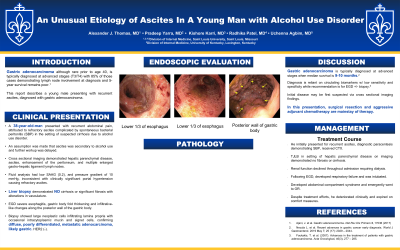Monday Poster Session
Category: Liver
P3142 - An Unusual Etiology of Ascites in a Young Man With Alcohol Use Disorder
Monday, October 28, 2024
10:30 AM - 4:00 PM ET
Location: Exhibit Hall E

Has Audio
- AT
Alexander J. Thomas, MD
SSM Health Saint Louis University Hospital
St. Louis, MO
Presenting Author(s)
Alexander J. Thomas, MD1, Pradeep Yarra, MD2, Kishore Karri, MBBS, MD3, Radhika Patel, MD1, Uchenna Agbim, MD1
1SSM Health Saint Louis University Hospital, St. Louis, MO; 2Saint Louis University School of Medicine, St. Louis, MO; 3University of Kentucky, Lexington, KY
Introduction: Gastric adenocarcinoma although rare prior to age 40, is typically diagnosed at advanced stages (T3/T4) with 85% of those cases demonstrating lymph node involvement at diagnosis and 5-year survival remains poor.1 This report describes a young male presenting with recurrent ascites, diagnosed with gastric adenocarcinoma.
Case Description/Methods: A 38-year-old male presented for recurrent abdominal pain, attributed to recurrent ascites complicated by spontaneous bacterial peritonitis (SBP) in the setting of suspected cirrhosis due to alcohol use disorder. An assumption was made that ascites was secondary to alcohol use and further work up was delayed. Cross sectional imaging demonstrated hepatic parenchymal disease, large volume ascites with thickening and enhancement of the peritoneum, and multiple enlarged gastro hepatic ligament lymph nodes. Peritoneal fluid analysis showed low serum ascites albumin gradient (0.2), and pressure gradient of 10 mm Hg, inconsistent with clinically significant portal hypertension causing refractory ascites. Liver biopsy demonstrated no cirrhosis or significant fibrosis with alterations in vasculature. Esophagogastroduodenoscopy (EGD) showed severe esophagitis, gastric body fold thickening and infiltrative-like changes along the posterior wall of the gastric body. Biopsies from EGD showed large neoplastic cells infiltrating lamina propria with occasional intracytoplasmic mucin and signet cells, confirming diffuse, poorly differentiated, metastatic adenocarcinoma, likely gastric. HER2 biomarker was negative. Despite treatment efforts, he deteriorated clinically and expired on comfort measures.
Discussion: Every ascites is not secondary to alcohol use disorder and requires comprehensive liver work up. Gastric adenocarcinoma is typically diagnosed at advanced stages, at which time median survival is ~ 9-10 months. [1] Current diagnosis is reliant on circulating biomarkers with low sensitivity and specificity, recommendation is for EGD +/- biopsy.[2] Treatment includes surgical resection of primary site +/- adjuvant chemotherapy, however in metastatic disease, palliative care is recommended for symptoms and quality of life. [3]
[1] Ajani, J. et al. Gastric adenocarcinoma. Nat Rev Dis Primers 3, 17036 (2017).
[2] Necula L. et al. Recent advances in gastric cancer early diagnosis. World J Gastroenterol. 2019 May 7; 25 (17): 2029-2044.
[3] Foukakis, T. et al. (2007). Advances in the treatment of patients with gastric adenocarcinoma. Acta Oncologica, 46(3), 277–285.
Disclosures:
Alexander J. Thomas, MD1, Pradeep Yarra, MD2, Kishore Karri, MBBS, MD3, Radhika Patel, MD1, Uchenna Agbim, MD1. P3142 - An Unusual Etiology of Ascites in a Young Man With Alcohol Use Disorder, ACG 2024 Annual Scientific Meeting Abstracts. Philadelphia, PA: American College of Gastroenterology.
1SSM Health Saint Louis University Hospital, St. Louis, MO; 2Saint Louis University School of Medicine, St. Louis, MO; 3University of Kentucky, Lexington, KY
Introduction: Gastric adenocarcinoma although rare prior to age 40, is typically diagnosed at advanced stages (T3/T4) with 85% of those cases demonstrating lymph node involvement at diagnosis and 5-year survival remains poor.1 This report describes a young male presenting with recurrent ascites, diagnosed with gastric adenocarcinoma.
Case Description/Methods: A 38-year-old male presented for recurrent abdominal pain, attributed to recurrent ascites complicated by spontaneous bacterial peritonitis (SBP) in the setting of suspected cirrhosis due to alcohol use disorder. An assumption was made that ascites was secondary to alcohol use and further work up was delayed. Cross sectional imaging demonstrated hepatic parenchymal disease, large volume ascites with thickening and enhancement of the peritoneum, and multiple enlarged gastro hepatic ligament lymph nodes. Peritoneal fluid analysis showed low serum ascites albumin gradient (0.2), and pressure gradient of 10 mm Hg, inconsistent with clinically significant portal hypertension causing refractory ascites. Liver biopsy demonstrated no cirrhosis or significant fibrosis with alterations in vasculature. Esophagogastroduodenoscopy (EGD) showed severe esophagitis, gastric body fold thickening and infiltrative-like changes along the posterior wall of the gastric body. Biopsies from EGD showed large neoplastic cells infiltrating lamina propria with occasional intracytoplasmic mucin and signet cells, confirming diffuse, poorly differentiated, metastatic adenocarcinoma, likely gastric. HER2 biomarker was negative. Despite treatment efforts, he deteriorated clinically and expired on comfort measures.
Discussion: Every ascites is not secondary to alcohol use disorder and requires comprehensive liver work up. Gastric adenocarcinoma is typically diagnosed at advanced stages, at which time median survival is ~ 9-10 months. [1] Current diagnosis is reliant on circulating biomarkers with low sensitivity and specificity, recommendation is for EGD +/- biopsy.[2] Treatment includes surgical resection of primary site +/- adjuvant chemotherapy, however in metastatic disease, palliative care is recommended for symptoms and quality of life. [3]
[1] Ajani, J. et al. Gastric adenocarcinoma. Nat Rev Dis Primers 3, 17036 (2017).
[2] Necula L. et al. Recent advances in gastric cancer early diagnosis. World J Gastroenterol. 2019 May 7; 25 (17): 2029-2044.
[3] Foukakis, T. et al. (2007). Advances in the treatment of patients with gastric adenocarcinoma. Acta Oncologica, 46(3), 277–285.
Disclosures:
Alexander Thomas indicated no relevant financial relationships.
Pradeep Yarra indicated no relevant financial relationships.
Kishore Karri indicated no relevant financial relationships.
Radhika Patel indicated no relevant financial relationships.
Uchenna Agbim indicated no relevant financial relationships.
Alexander J. Thomas, MD1, Pradeep Yarra, MD2, Kishore Karri, MBBS, MD3, Radhika Patel, MD1, Uchenna Agbim, MD1. P3142 - An Unusual Etiology of Ascites in a Young Man With Alcohol Use Disorder, ACG 2024 Annual Scientific Meeting Abstracts. Philadelphia, PA: American College of Gastroenterology.
